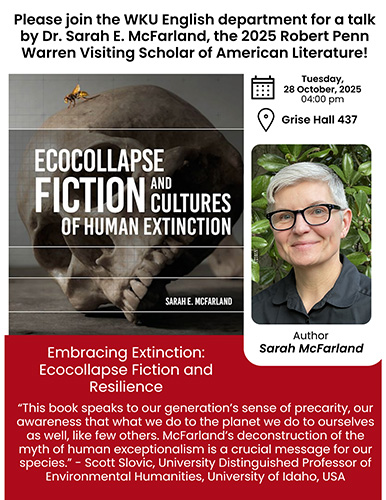WKU News
Human Exceptionalism in a Future Apocalyptic Anthropocene: How Can Literature Help Us Imagine What Comes Next?
- Brielle Freeman
- Thursday, October 23rd, 2025

Dr. Sarah McFarland, an author, professor, and avid ecocritic, explores this question in her upcoming presentation at WKU, highlighting her book Ecocollapse Fiction and Cultures of Human Extinction. She holds a Ph.D. in Literature and the Environment from the University of Oregon and is a Professor of English at Northwestern State University of Louisiana. Deeply engaged with environmental issues, her early work focused on animals and the construction of species categories, leading her to closely examine how they were constructing these in their rhetorical efforts.
“I looked at how authors identified that they were traveling through a wilderness area by virtue of encountering a dangerous wild megafauna species, and how they survived that, which gets back to the pernicious myth of the hero’s quest.” She notes that this theme runs through many different literary genres. In her argument against the pernicious narrative of the hero’s quest, she shares how her writing process led her to this ending of choice.
“As tempting as it was, I didn’t want to end my own book about that with this happy ending. How do we stick with this idea? Instead of thinking, here’s how we pop back out from these problems I pointed out, it was by thinking about what might come next in our climate change future.”
This concept inspired the inclusion of the wasp as a key element on the book’s cover. The bright yellow wasp provides a striking contrast against the death and decay symbolized by a gray human skull.
“I discovered there’s a species of wasp, Vespa Orientalis, that has a photosynthetic capacity and uses sound vibrations to communicate. I thought, ‘That is so cool!’ They host an array of potential, flexible adaptations in place to enable a transition beyond the Anthropocene that I like to kind of imagine is becoming the next charismatic megafauna on Earth.”
This species of wasp nests underground and is the only known animal capable of operating like a plant, deriving energy directly from sunlight through photosynthetic origins on its abdomen.
“Who knows what comes next? But how neat to imagine it might be something like a totally different species taking over?”
She examines literary representations of various elements of the natural world and recognizes the value of bridging ecology and literature.
“We get to use ALL the tools”
She alludes to the most exciting element in the field of ecocriticism and humanities being the ability to implement the methodologies from so many other disciplines. The chance to break down those perceptions of siloing in different ways shows that this avenue supplies a holistic approach.
“We are able to apply biological understandings to what is happening in literary texts. It gives us so many resources to better unpack what’s happening in a textual field.”
In her own teachings, she identifies ways that authors represent relations with the natural environment.
“How were they looking at language to position themselves in relation to the figures within their texts. Where could I find playful undoing of the stereotypical metaphors or human/non-human binaries?”
This was excellent training in identifying the kinds of connections that she believes come to fruition within her book, Ecocollapse Fiction and Cultures of Human Extinction.
“I always go back to the literary analysis as the root methodology. This is what I tell my students: You can’t just throw out a theory of science [or related fields], you have to demonstrate how the text accomplishes that, which involves that close reading practice.”
She touches on the impression that the book “The Road” by Cormac McCarthy made on her and will elaborate on this dynamic in her upcoming presentation.
“Looking at how novels depict this sort of inevitable collapse of ecosystems and then the collapse of human civilization, and what that tells us about our own cultural anxieties regarding environmental degradation and mass extinction events that we’re seeing right now has been a fascinating opportunity for creating a critical framework for reading ecocollapse fiction.”
Please join us in welcoming Sarah McFarland, Ph.D., on Tuesday October 28 at 4 p.m. in Grise Hall, Room 437.
Some of the links on this page may require additional software to view.

